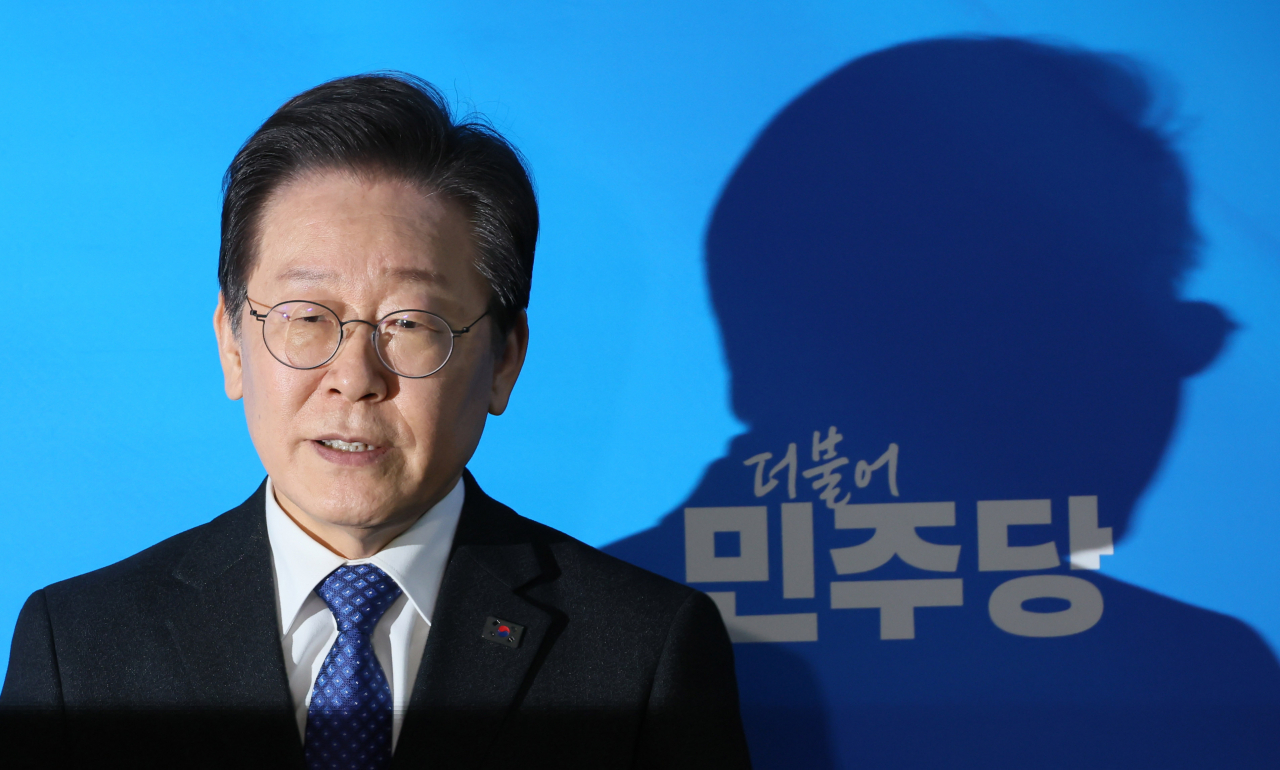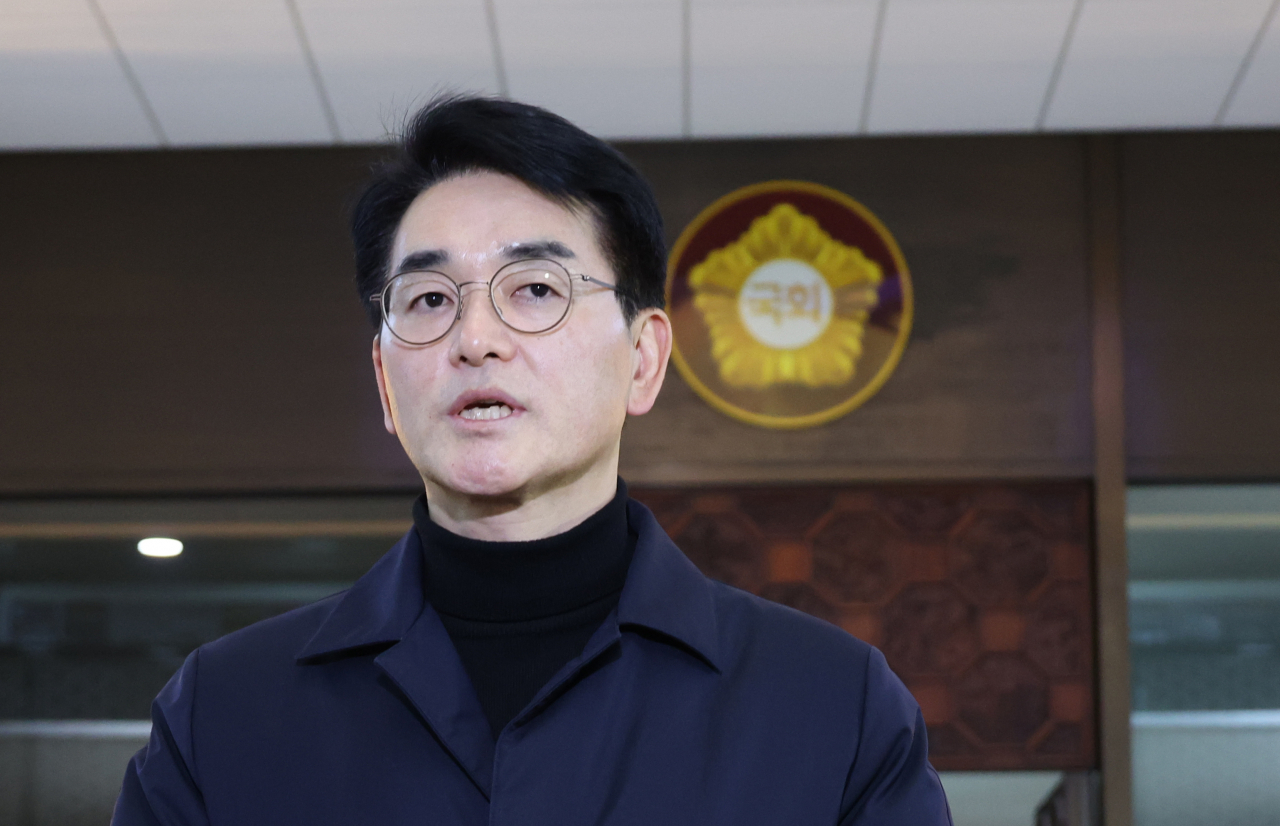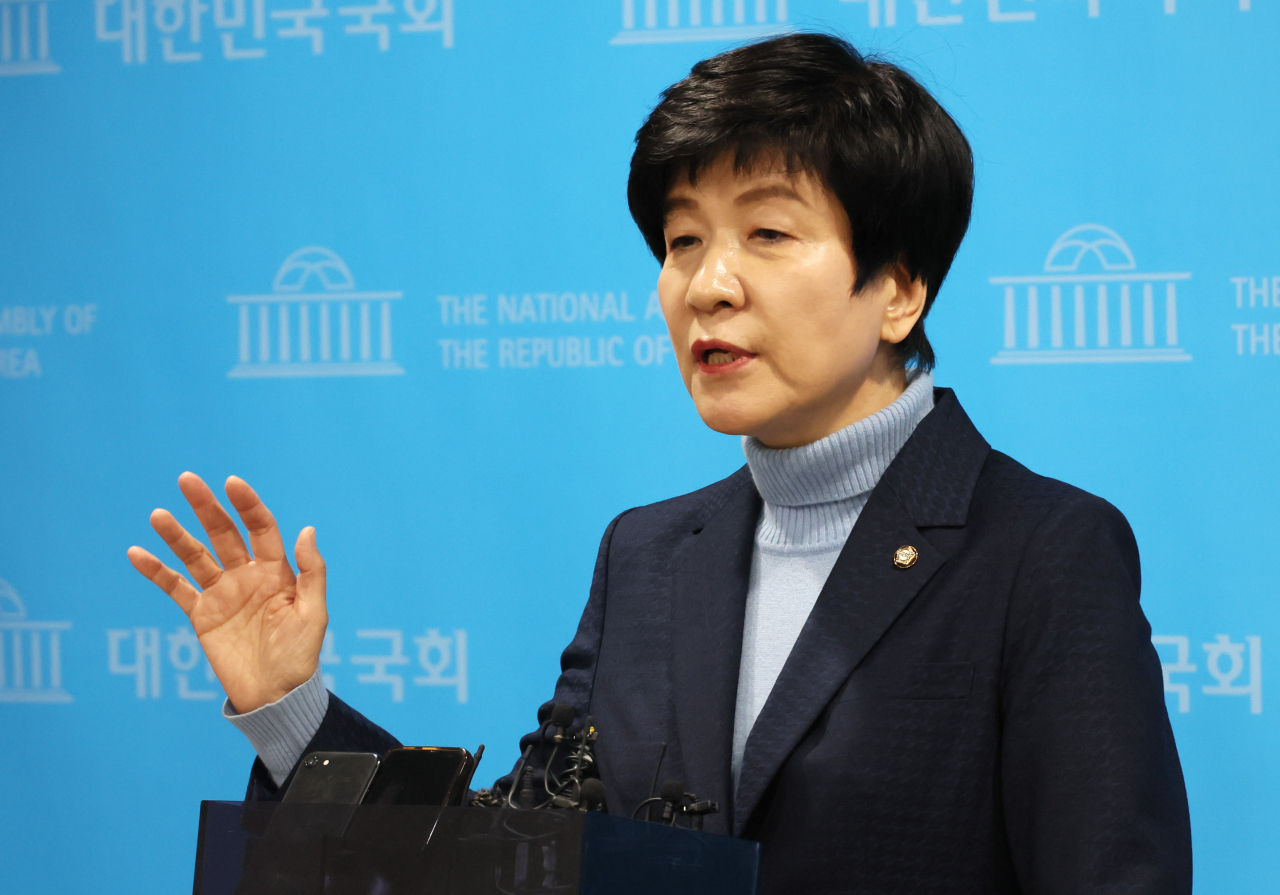 |
Democratic Party Chairman Rep. Lee Jae-myung speaks during the press briefing held at the National Assembly on Thursday. (Yonhap) |
An internal rift in the main opposition Democratic Party of Korea has widened amid accusations from current and outgoing party members that the candidate nomination process for the April legislative election is unfair and lacks transparency.
Both the ruling People Power Party and the Democratic Party have been gradually selecting their candidates to run in South Korea's 253 constituencies. Lawmakers are either elected directly by the constituency or through a proportional representation system to fill the rest of the 300 National Assembly seats. The parliamentary election will be held on April 10.
While the process is still underway, some party members, including incumbent lawmakers, have been expressing frustration over the nominations so far, which they believe are unfairly tilted in favor of Lee's supporters in the party.
There are speculations that the candidates are being assessed and selected behind closed doors, and that Lee might be trying to interfere in the nomination process to protect himself from further attempts to seek criminal charges against him. Lee has been indicted for corruption and breach of trust.
Rep. Kim Min-seok, who oversees the Democratic Party's nomination process, denied the accusations. He told reporters after an emergency party leadership meeting at the National Assembly on Sunday that the party's nomination process was based on a system where "party members' choice matters the most," adding there is "no room for intervention from the party leadership."
But the opposition party has not disclosed details of the party's criteria for candidate nomination process, despite calls for it to do so. The party holds a legislative majority , with 163 out of all 297 lawmakers, enabling the party to prevent much of the attempts by President Yoon Suk Yeol and his conservative bloc to push through their agenda.
Among those calling for the disclosure are DP Reps. Park Yong-jin and Kim Han-jung, who will face an internal run-off with fellow party members to determine which candidate will represent the party in their constituencies. In contrast, some pro-Lee faction lawmakers will be uncontested in their constituencies.
Both Park and Kim earlier revealed the party had labeled them "underperformers" according to a party evaluation, based on a combination of quantitative and qualitative assessments. Their performance level was among the bottom 20 percent of all Democratic Party lawmakers, according to the party.
Kim, a two-term lawmaker, said in a radio interview Friday that Lee "appears to be obsessed with ... making the party better serve as a bulletproof vest."
In September, a motion to permit lawmaker Lee's arrest was passed by the National Assembly with less than half of the lawmakers voting against it, a surprise outcome given his party held a simple majority that could have terminated the motion. Lee was not arrested because a court rejected Lee's arrest warrant later on. The identity of those who did not vote along party lines is undisclosed as the vote was made through a secret ballot.
 |
Democratic Party of Korea Rep. Park Yong-jin speaks to reporters at the National Assembly on Thursday. (Yonhap) |
Park, who is also a two-term lawmaker, said his party "failed to open up about the evaluation process," adding he "could not understand why the party is trying to conceal" the process.
Four-term lawmaker Noh Woong-rae has been on a hunger strike since the Democratic Party ruled him out as this years candidate in his constituency.
Noh accused Lee of "manipulating the party's affairs." Noh is also facing a bribery allegation.
So far, five opposition party lawmakers have left the party after refusing to accept nomination decisions.
Rep. Kim Young-joo, deputy National Assembly speaker and a four-term lawmaker, earlier called for the disclosure of the party's assessment criteria "as long as the assessment takes place within a political context aimed at slaying (his political opponents)."
Known as a staunch supporter of liberal former President Moon Jae-in, Kim parted ways with the opposition party after the party labeled her an underperformer.
Rep. Lee Su-jin, who beat conservative Na Kyung-won in the previous election, also quit the party Thursday after the party decided not to nominate her to run. Lee said she was bullied by Lee Jae-myung's supporters after the party's decision.
Their departure followed those of Rep. Kim Jong-min, Rep. Lee Won-wook and Rep. Cho Eung-cheon. Kim joined the New Future Party formed by ex-Prime Minister Lee Nak-yon, whereas Lee and Cho went to the New Reform Party led by estranged former People Power Party leader Lee Jun-seok.
Moreover, floor leader Rep. Hong Ihk-pyo reportedly expressed disappointment over the party's refusal to disclose the evaluation criteria.
 |
Deputy National Assembly Speaker Rep. Kim Young-joon speaks to reporters at the National Assembly to announce her departure from the Democratic Party of Korea on Feb. 19. (Yonhap) |
In the most recent poll, the Democratic Party was viewed favorably by 35 percent of respondents, slightly outnumbered by the ruling People Power Party's 37 percent, according to a poll by Gallup Korea during the fourth week of February.
The same poll indicated that the People Power Party was outperforming the Democratic Party regarding party innovation and pursuit of justice. The gap was larger among swing voters, the poll also showed.
Gallup Korea's poll showed that "conflict between factions erupted within the party in decision-making processes" concerning the candidate nomination process and system for the proportional allocation of parliamentary seats.
People Power Party spokesperson Kim Min-su said in a statement Saturday that the Democratic Party's candidates are being nominated "based on how loyal the candidates are to Chair Lee."
The ruling party earlier announced that the evaluation process was being shared with all potential candidates.
Meanwhile, the Democratic Party played down concerns that it was facing a crisis.
Kim of the Democratic Party who oversees the nomination process said the situation will improve "in a couple of weeks."
Chair Lee also said on Thursday that the party was "turning over a new leaf as (it was) suffering challenges," when asked about any internal rift in the party.







![[Today’s K-pop] Blackpink’s Jennie, Lisa invited to Coachella as solo acts](http://res.heraldm.com/phpwas/restmb_idxmake.php?idx=644&simg=/content/image/2024/11/21/20241121050099_0.jpg)